Kraków may not always top the list of Europe’s most famous cities, but it is a hidden gem awaiting discovery. With its remarkable Renaissance architecture, charming shops, and delightful dining options, the city entices a diverse array of travelers.
Editor’s note: This article is part of our series on travel guides to your favorite destinations. Check out our Vienna, Berlin, Budapest, Toronto, Milan, Rome and New York City guides, and look out for guides to other cities coming soon.
Among these are a significant number of Jewish visitors, drawn by Kraków’s rich and complex Jewish history. This history spans from the first recorded Jewish presence in the 13th century to the devastating impact of the Holocaust and the revival of Jewish culture and life in the city today.
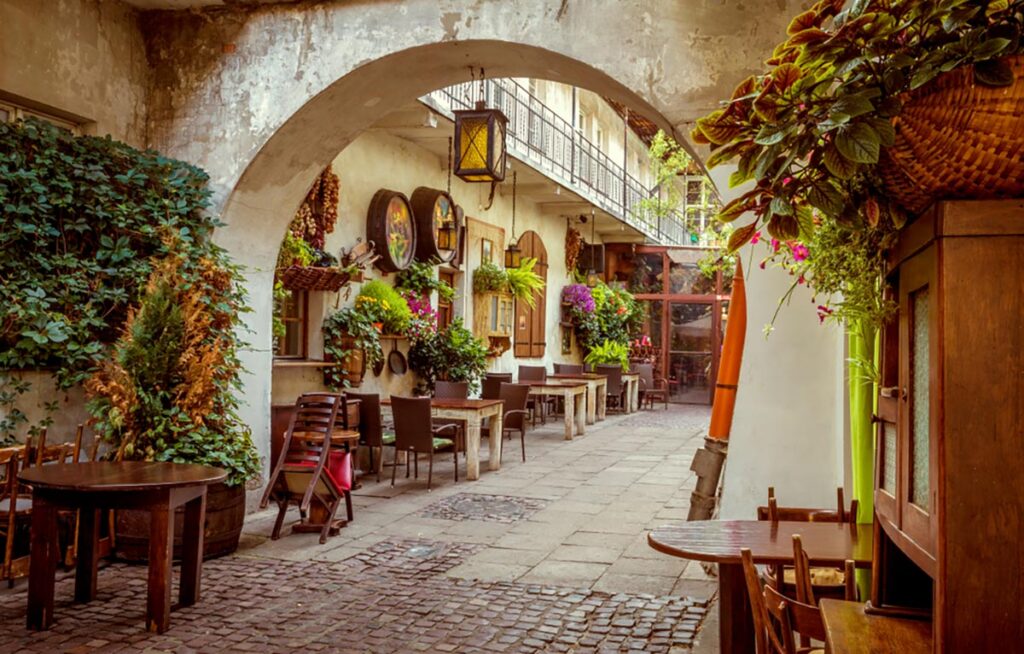
Whether you have a week or just a few hours to explore the city’s Jewish past and present, we’ve got you covered for what to see, where to go, and (because no good Jewish trip would be complete without it) where to nosh.
What to see
Remah Synagogue and Cemetery
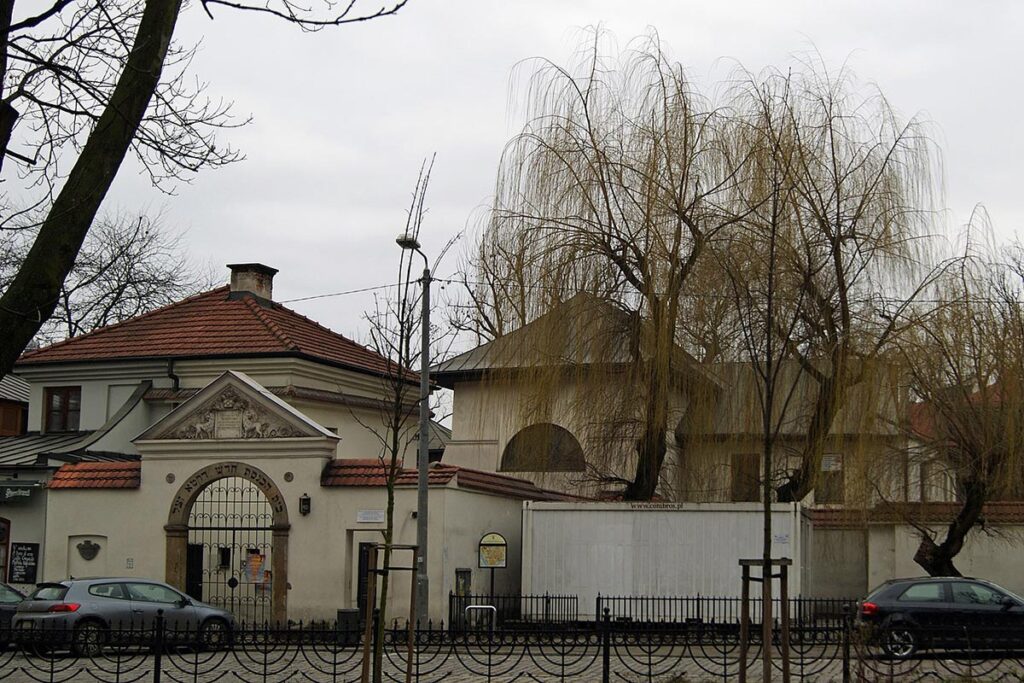
Located in the heart of Kazimierz (the Jewish Quarter) is the historic Remah Synagogue, one of two active synagogues in the city today. You can attend services there, which take place each Friday evening.
Constructed in about 1558, the synagogue is named after Rabbi Moses Isserles, a Kraków local known as the Remah. Isserles is famed for writing commentaries to complement Rabbi Joseph Karo’s Shulchan Aruch, with Ashkenazi traditions and customs.
Adjacent to the synagogue is the Remah cemetery, which dates back to the same era and is the resting place of Isserles and many other notable Polish Jews. Every year, on the anniversary of Isserles’ passing, Jews come from near and far to pay their respects to the influential rabbi.
During World War II, the Nazis destroyed the site and stole the tombstones, using them as paving stones in concentration camps. After the war, the tombstones were returned to the cemetery and it has since undergone multiple restorations. Though it closed for burials in the 19th century, visitors can still explore this site, one of the oldest Jewish cemeteries in Europe.
The Austeria bookstore
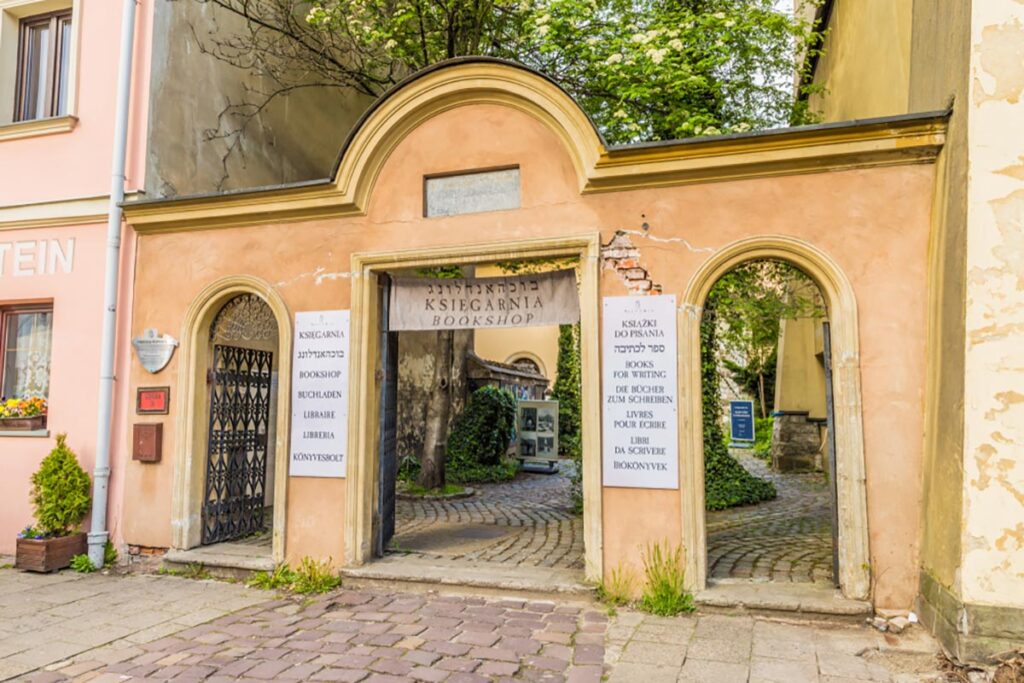
Tucked away in a quaint alleyway off Kazimierz’s main street, Austeria is a literary haven housed in the historic 17th-century Popper Synagogue.
As you step into this charming bookstore, you’ll encounter a huge antique map of Galicia — a historical region in Central and Eastern Europe, once home to a vibrant Jewish community.
Inside, the space is a treasure trove of Jewish and Yiddish literature, featuring an extensive collection of historical books, poetry, and more. You’ll also find an array of Yiddish postcards, maps, jewelry, posters, and other beautifully crafted Jewish artifacts.
The bookstore also offers a large selection of books in multiple languages including Hebrew, Yiddish, Italian, French, German, Hungarian and English.
Podgórze District
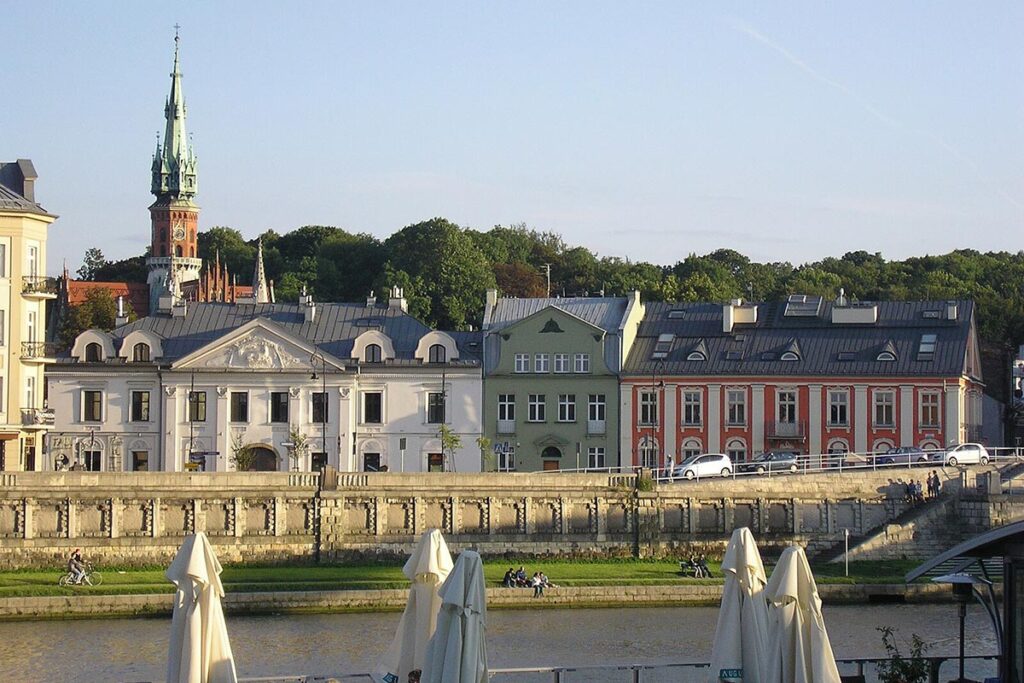
If you venture beyond Kazimierz and cross the Vistula River, you will reach the Podgórze District, the site of the Kraków Ghetto and Oskar Schindler’s factory during World War II (read more about Schindler’s factory below).
In March 1941, the Jewish community of Kraków was forcibly relocated to the Podgórze District, which was then sealed off to create the Kraków Ghetto. Two years later, the ghetto was brutally liquidated. Many of its residents were murdered inside, while others were killed in the KL Płaszów concentration camp, Auschwitz, and Bełżec.
Today, this area educates visitors about the Polish Jewish community’s experience during the war and the devastating impact of the Holocaust. Visiting here, you will see the memorial to Jews from the Kraków Ghetto and the remnants of the original Ghetto wall.
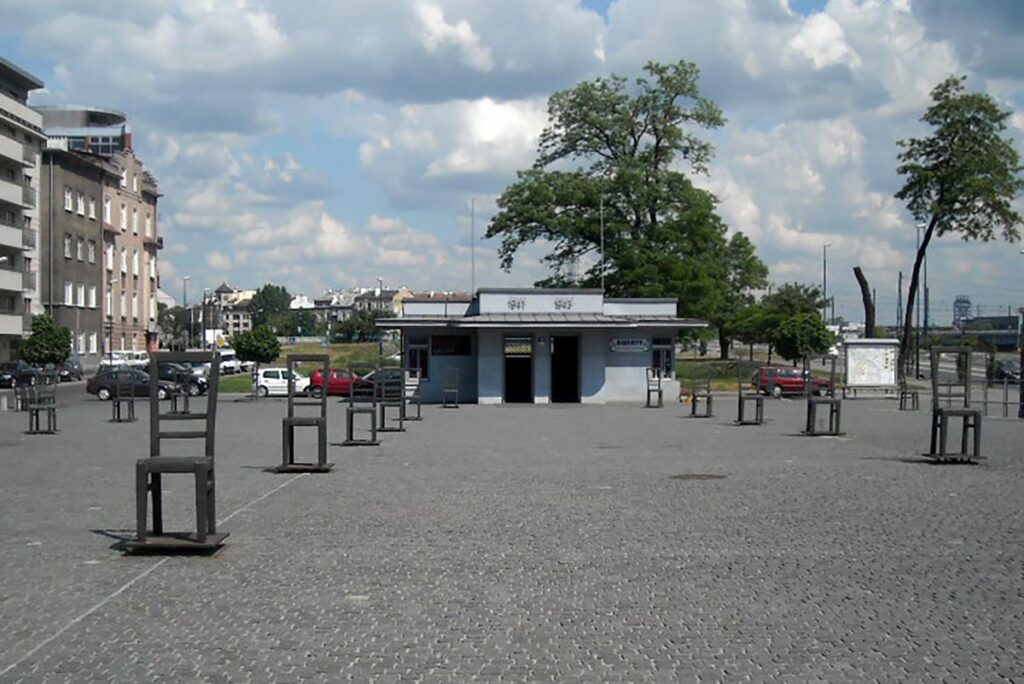
Both feature plaques that provide a comprehensive look into life in the Jewish ghetto, the functioning of local factories, and the harrowing events that transpired during the two years of Nazi operation.
The New Jewish Cemetery
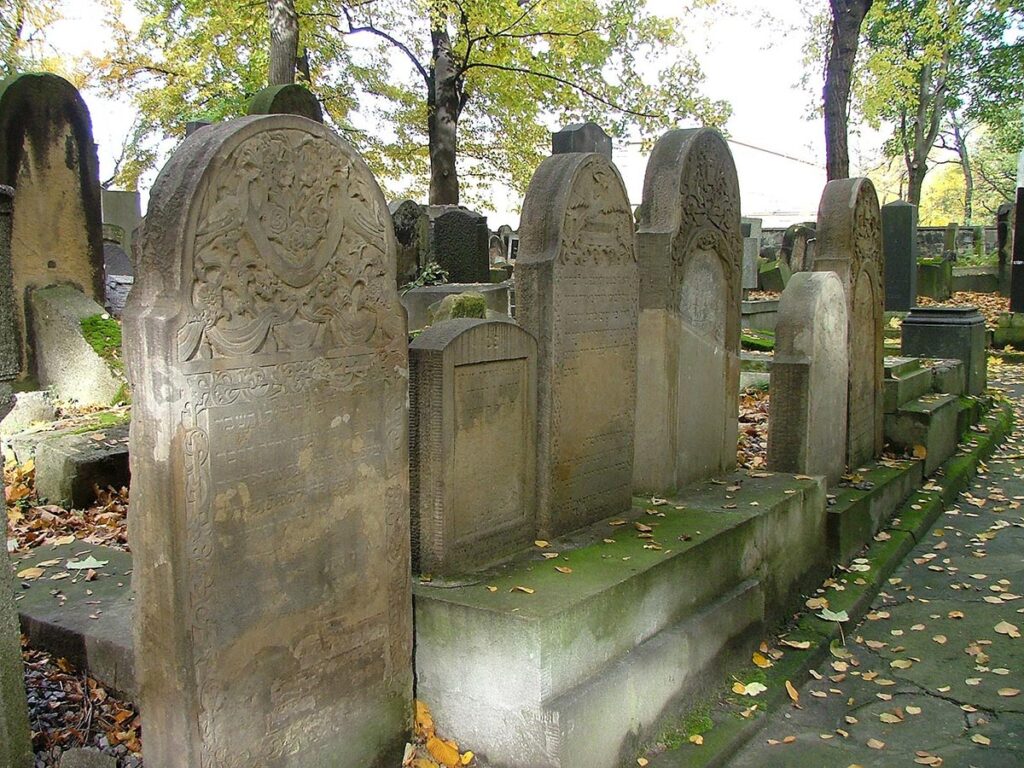
A short walk from the bustling main street of Kazimierz, you’ll find the New Jewish Cemetery. Established in 1801, it is currently the only operating Jewish cemetery in Kraków.
Spanning 11 acres of land, the cemetery was severely destroyed by the Nazis during World War II, but fortunately was restored in the early 21st century.
The cemetery is home to over 7,000 graves, including those of known Holocaust survivors and notable individuals, like famous composer and conductor Leopold Kozłowski.
Kozlowski, a renowned Kraków local, earned the nickname “the last klezmer of Galicia” for his contributions to klezmer music.
What to do
Galicia Jewish Museum
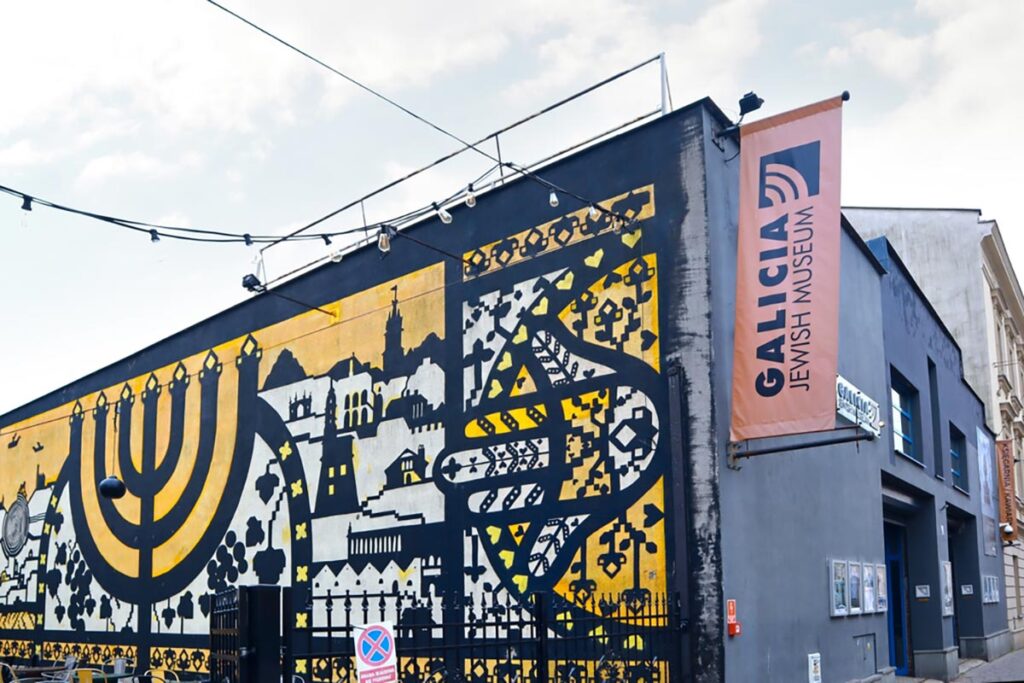
Located in Kazimierz, the Galicia Jewish Museum offers a unique and moving exploration of Jewish history in the Galician region. The museum’s exhibitions delve into various aspects of Jewish life in Galicia, from pre-war traditions and community life to the impact of the Holocaust. The museum also focuses on Jewish renewal in contemporary Poland.
“The objectives of the museum are to challenge the stereotypes and misconceptions typically associated with the Jewish past in Poland and to educate both Poles and Jews about their own histories, while encouraging them to think about the future,” according to the museum website.
The museum’s permanent exhibitions include “Traces of Memory,” which commemorates the 800-year Jewish presence in western Galicia and “10 Polish cities — 10 Jewish stories,” highlighting the personal stories and family photographs of 10 Polish Jews.
Oskar Schindler’s Enamel Factory
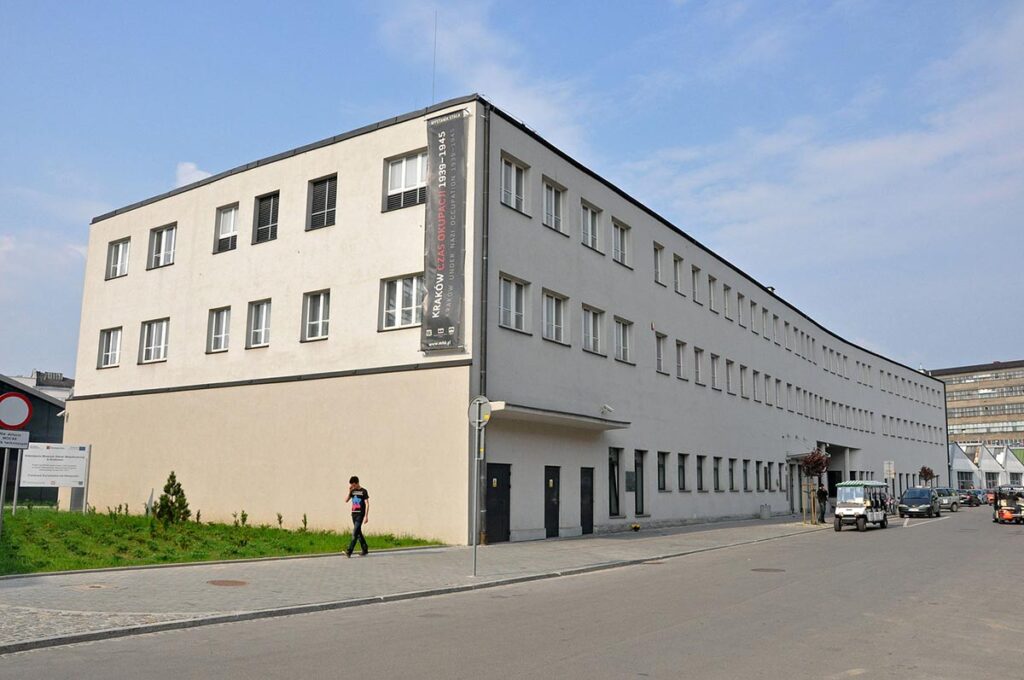
Oskar Schindler, the central figure in the 1993 film “Schindler’s List,” was a German industrialist who saved over 1,000 Jews in the Holocaust by employing them in his Kraków factory, Emalia.
To delve deeper into the story of this Holocaust hero, visit Oskar Schindler’s Enamel Factory, a museum located in the Podgórze District. Housed in one of Schindler’s factory buildings, the museum offers exhibitions detailing Jewish history, life in the Kraków Ghetto, Schindler’s life-saving efforts, and more.
Jewish walking tour
For a comprehensive understanding of Kraków’s Jewish history, consider taking a Jewish walking tour through the Jewish Quarter and beyond. These tours come in various formats with both free and paid options available.
Each tour offers unique insights — some guides delve into the Jewish history of Kraków from centuries ago up to the post-World War II era, while others focus on Jewish life in the city today.
Plac Nowy Market
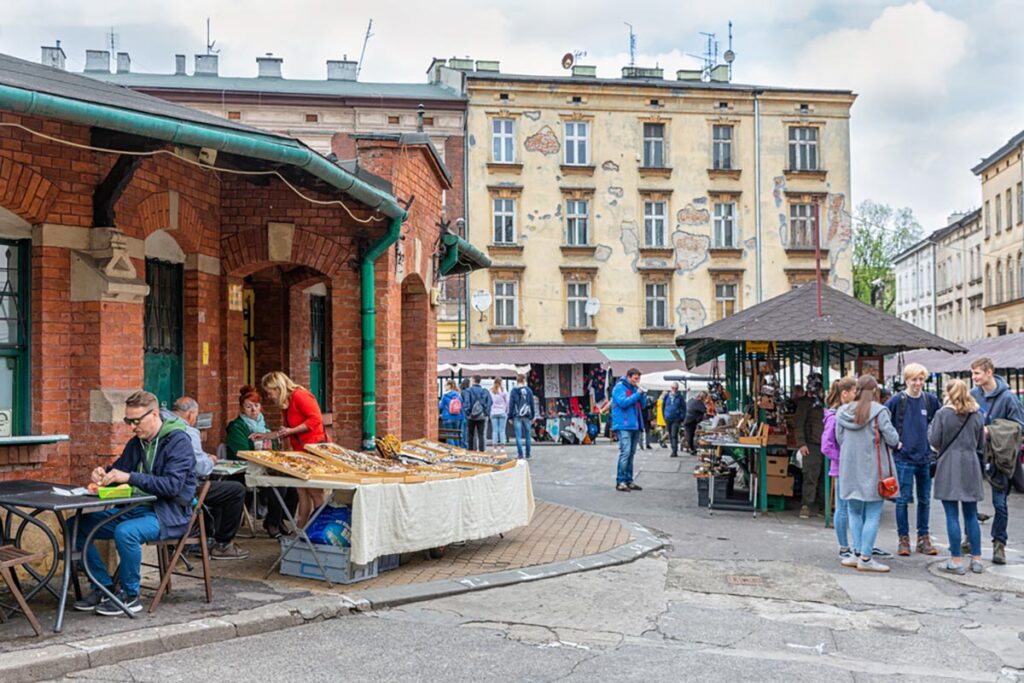
For great food, drinks and amazing thrift shopping, visit Plac Nowy Market. Located in the heart of Kraków’s old Jewish quarter, this historic square is now the epicenter of shopping and nightlife in the city.
Once a center of Jewish life in the 20th century, the area now hosts an antique and vintage goods flea market on the weekends.
The central building, once a kosher slaughterhouse, now sells some of the best open-faced sandwiches (known by locals as “zapiekanki”) in the city. With over 300 merchant stands and a diverse range of food and drink options, Plac Nowy Market is a haven for foodies and shoppers alike.
The Jewish Culture Festival
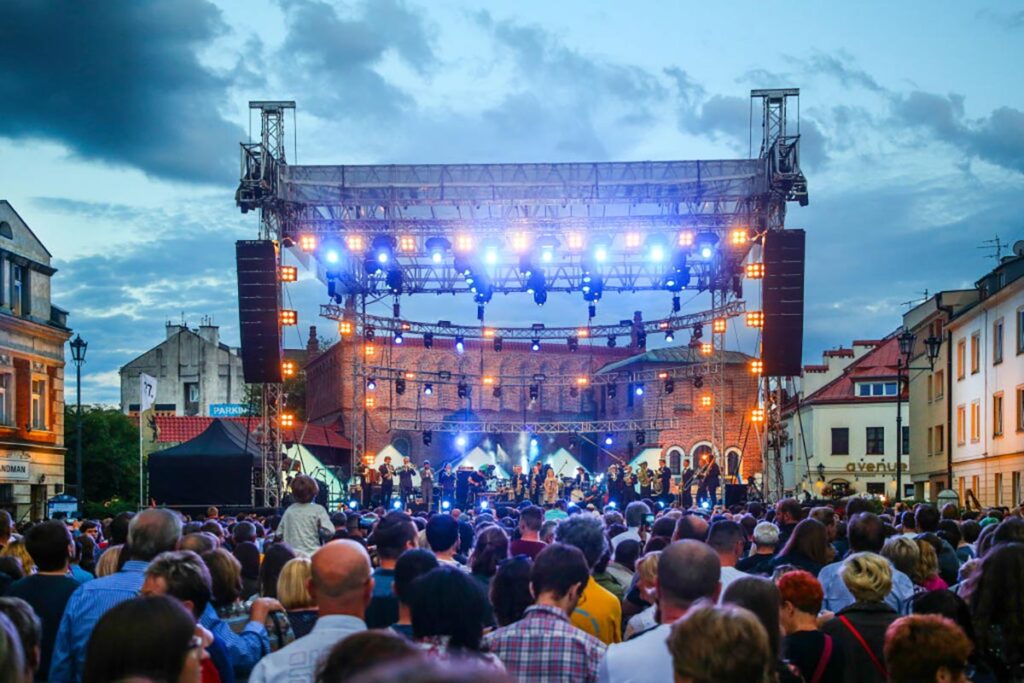
One of the most popular tourist attractions in Kraków is the Jewish Culture Festival, held every June in the historic Kazimierz district.
Founded in 1988, the festival has sparked a revival of Jewish culture in the city through its concerts, dance performances, art exhibitions, workshops, and guided tours.
If you’re visiting during the 10-day festival, you can choose from approximately 300 events and immerse yourself in Jewish culture in Kraków. The festival is a unique opportunity for those of all ages to explore the diversity of Jewish culture while connecting with others from around the world.
How to spend Shabbat
If you find yourself in Kraków during Shabbat, you can attend services at the Remah Synagogue or Tempel Synagogue, both of which have rich historical significance in the city’s Jewish life.
The Remah Synagogue is the oldest active synagogue in Kraków, built in the mid-1500s, and hosts Friday evening services. The Tempel Synagogue was built in the 1860s and hosts occasional services.
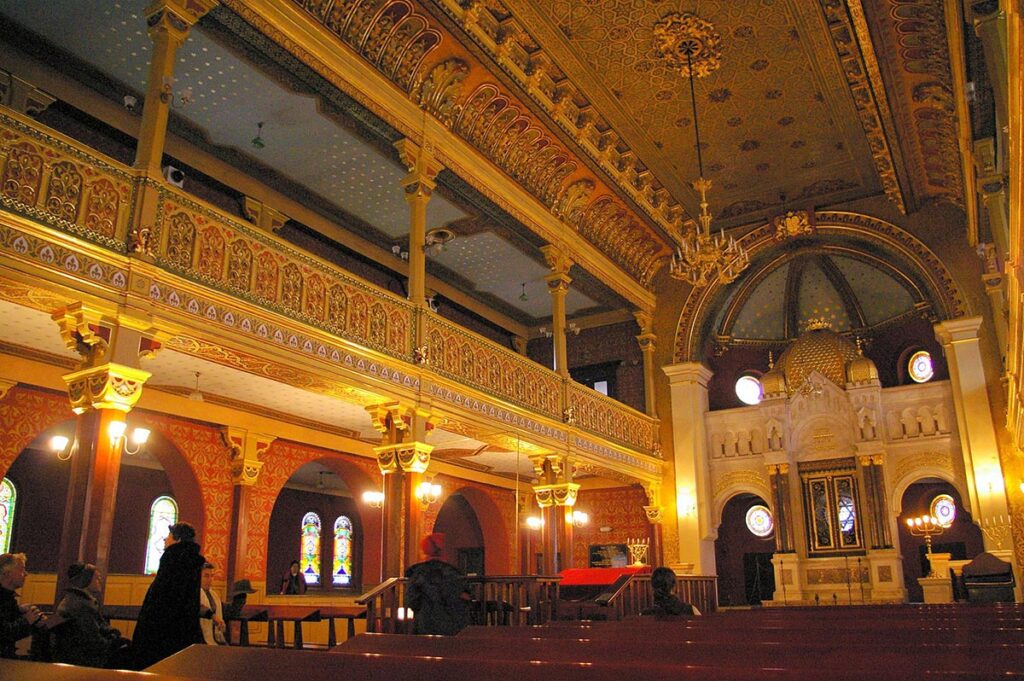
You can also attend services and have Shabbat dinner with locals and tourists at the JCC in Kraków. Chabad Lubawicz Kraków is another excellent resource that can help you find Shabbat-friendly accommodations, kosher restaurants, and more.
Where to eat
Kraków’s culinary scene extends far beyond the traditional Polish pierogies and red borscht. It reflects the city’s diverse history, especially in the Jewish Quarter, where the restaurant scene, reflecting a fusion of Israeli, Polish, and Galician Jewish influences, is booming. Here are some of the most popular Jewish restaurants and cafés to try.
The kosher scene
There are several great kosher restaurants in Kraków, catering to various tastes and budgets. In the heart of Kazimierz, you’ll find Falafel Shelanu and Hachnosat Orchim Krakow, both offering mid-range Israeli fare.
For a more upscale and unique experience, try Klezmer Hois, located near the Remah Synagogue. This former mikveh turned hotel and restaurant specializes in Eastern European Jewish fare. Their menu includes Viennese schnitzel, duck, lamb, beetroot soup, and more. Enjoy the live performances of klezmer music while you dine.
Traditional Polish-Jewish fare
For traditional Polish-Jewish cuisine, head to Ariel and Chajim Kohan. Located in a refurbished 20th-century building in the heart of Kazimierz, Ariel serves as both a restaurant and art gallery.
Their menu includes classic dishes like stuffed cabbage, matzah ball soup, and kofta, allowing you to savor the traditional flavors of Polish-Jewish cuisine.
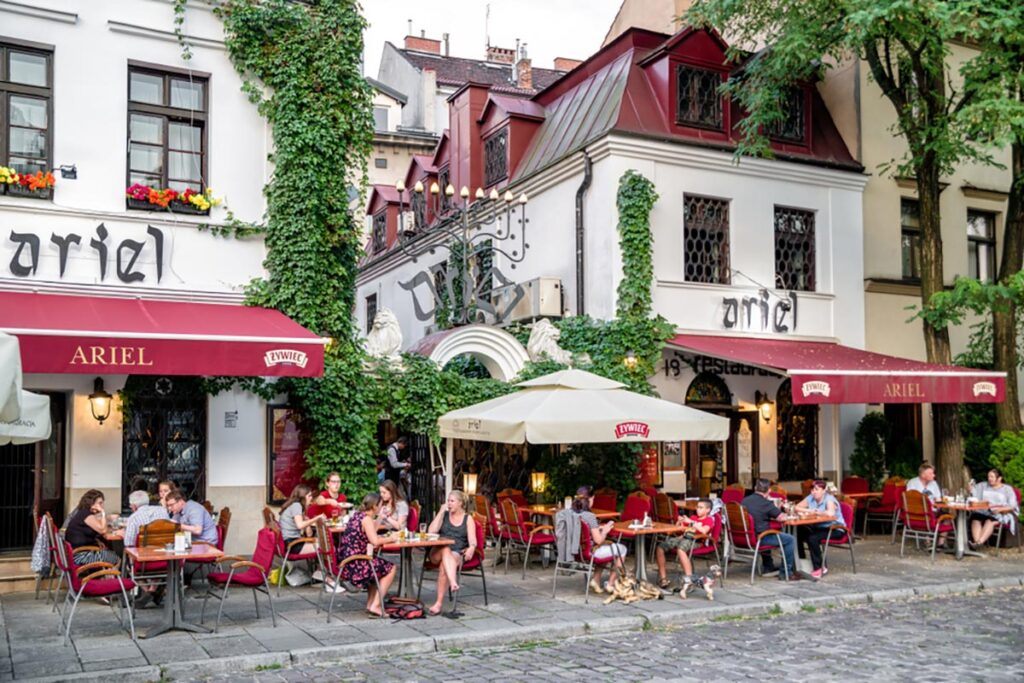
Chajim Kohan, also known as Once Upon A Time, is a funky gastropub, performance venue, and museum all in one where you can listen to live music, learn about the history of Kazimierz, and indulge in classic dishes like gefilte fish, pierogies, cholent, and borsch.
Israeli eats
Located just steps away from Ariel, Hamsa is an Israeli restaurant suitable for vegans, vegetarians, and meat-lovers alike. Their menu features a blend of Israeli, Moroccan, Lebanese, and North African Jewish cuisine, offering a variety of dishes like tagine, falafel, labneh, harira, kebabs, and pastrami.

Travel back in time and take in the ornate faded frescos, vintage furniture, and Polish posters at HEVRE Bar & Restaurant.
The restaurant, once a prayer house, now operates as a bar and restaurant serving Jewish-Galician cuisine and signature cocktails. Whether you’re there for brunch or a late-night snack, don’t miss their signature dishes like shakshuka and falafel.
When will you be visiting Kraków? Let us know on Instagram, Twitter, and TikTok!
